The 2010 U.S. Census recorded 79,046 black Americans with Campbell as their last name. That represented 20% of the total of 386,157 entries.
This article compares census numbers before and after the Civil War. We also look at historic African American people named Campbell in the last three centuries.
We end with a review of early records of black military service in the United States.
Campbell Before The Civil War
The 1850 census was the first to record all free members of households together. Before this, people who were not white were not named in the federal census.
In 1850, there was a box to enter color on the census. There were three categories: white, black, and mulatto. The third term is the language of the time, and I will use mixed in this article.
If you are researching your black Campbell ancestors in census archives, be sure to check the two non-white categories. Do not assume that the people recording the information were always correct.
1850 Federal Census
There were 418 people named Campbell who were recorded as black in the 1850 census. 260 were recorded as mixed.
Because they are in the main federal census, we know that they were free citizens.
There was a total of 38,787 free citizens named Campbell that year. There would be one more census in 1860 before the Civil War.
After The Civil War
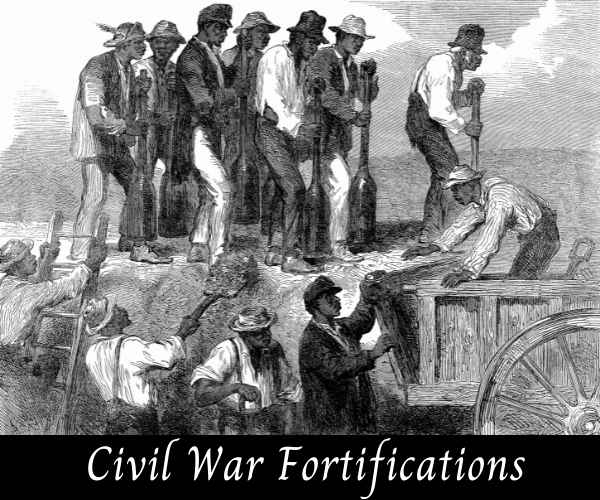
The 1870 census was the first survey after the Civil War and the Emancipation Proclamation. All African Americans were included.
Those who were omitted in 1850 and 1860 because they were enslaved were now recorded.
7,106 people named Campbell were recorded in the 1870 census as black and 1,132 as mixed.
There was a total of 70,077 people with the name.
Campbell In The 1900 And 1940 Census
The mixed category was dropped in 1900, so we just need to look at the black numbers this time.
The 1900 census recorded 14,338 people named Campbell as black within a total of 121,764 that year.
By the way, the mixed category returned in the 1910 and 1920 censuses. It was dropped again in 1930, but replaced with extra categories for colored and non-white in a way that seems confusing now.
This changed again in 1940 and we can simply focus on one black category.
The 1940 census recorded 23,014 people named Campbell as black within a total of 200,744.
Historic Black Figures With The Campbell Surname
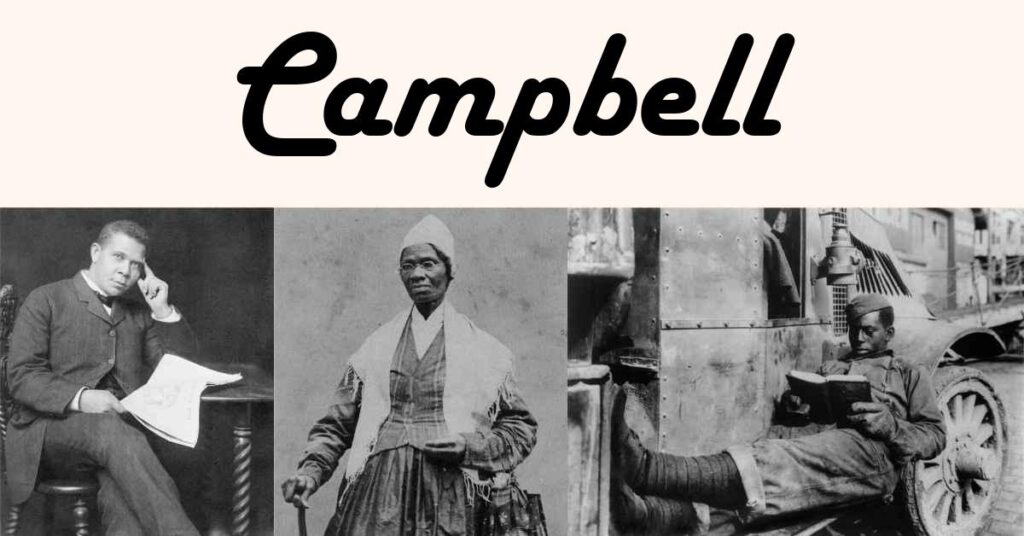
Here are some notable African American people in history with Campbell as their last name.
Tunis Campbell
- Born: 1812
- From: Middlebrook, New Jersey
- Died: 1891
Born to free parents in 1812, Tunis Campbell preached against slavery and established schools for black children. Before the Civil War, he often spoke alongside Frederick Douglass, the great abolitionist.
After the war, Campbell was heavily involved in the Reconstruction of the South. As Vice President of the Republican Party of Georgia, he was elected a state senator.
He pushed for equal education and fair voting despite the constant threat of violence which eventually drove him out of the state.
Tunis Campbell wrote two books. The first, published in 1848, was a well-received guide for the management and staff of hotels. This was based on his early experiences as a head waiter at a hotel in New York.
The second is more historically significant. He published an account in 1877 about how he and his family were forced out of the southern state.
It was titled “Sufferings of the Reverend T.G. Campbell and His Family In Georgia“. You can find an online copy at the Cornell University digital library.
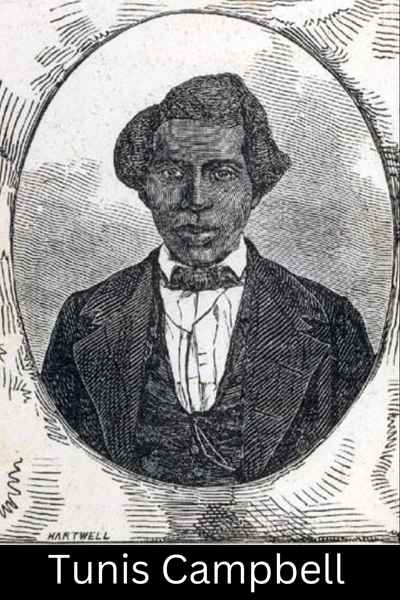
Other early narratives
Here are more early autobiographies:
Sarah Campbell
- Born: 1823
- From: Kentucky
- Died:
Sarah “Sally” Campbell was put to work on a riverboat aged 11. She persuaded a passenger who was an attorney to help obtain her freedom in court in 1837.
Later as a widowed free woman, Sally joined Custer’s Black Hills Expedition as a cook. She was the first non-native woman to enter the Black Hills.
Known as Aunt Sally, she filed a claim for a silver mine that she later sold for 500 dollars in about 1886. This was a tidy sum in those times.
That was just one of five or six claims she made in the 1870s. She was the first woman to file a claim in the Black Hills. The Custer County records still have at least one in their archive.
Out of her handful of claims, the silver mine was the one that proved to be profitable. That’s a reasonable return in this risky business. Aunt Sally named it the “Alice Lode”.
Sarah Campbell filed her claims after the Civil War as did Fred Coleman in the California Gold Rush. In contrast, Barney Ford was denied profits from his claims in the 1850s Colorado Gold Rush.
Other successful African Americans in business
Here are some highly successful black entrepreneurs and business people from the 19th and 20th centuries.
- JT Allen of Rhode Island
- Sally Campbell of the Black Hills
- Hermann Russell of Atlanta
- Madam C J Walker of Louisiana
Campbell In Black Military Records
Military records are a rich resource of for family history research. Here are examples of the Campbell surname from three different military services:
- Buffalo soldiers
- Black civil war sailors
- Tuskegee airmen
Buffalo Soldiers
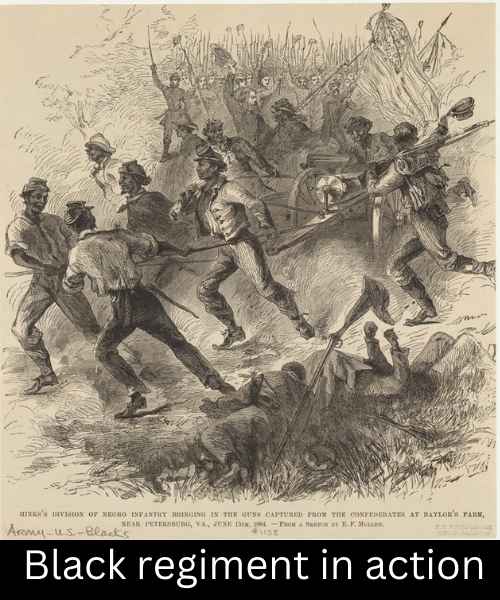
Five regiments for black soldiers were formed during the Civil War. They were known as the Buffalo Soldiers.
Their records are part of the national archive of military monthly returns. The information includes the year and place of birth, where they enlisted, their occupation, and their height.
One of the earliest military entries for Campbell was in May 1867.
James Campbell was a Private in the Tenth Cavalry. He was stationed in May 1867 at Fort Gibson, Connecticut.
One of the later entries was in December 1914. John Campbell was a Trumpeter in the Ninth Cavalry.
If you are researching military ancestors, there is a free index of these records on Ancestry.com and FamilySearch.org. You have to create an account on either website, but you do not need to pay for the Buffalo Soldiers archive.
Black Civil War Sailors
The National Parks Service has a free archive of African American sailors during the Civil War.
The information includes their age, height, rank, occupation, and where and when they enlisted. It also includes every ship that they served on.
You can search the database on the National Parks website.
One of the earliest entries for Campbell was for Joshua Campbell from Wilmington, Delaware. He enlisted in November 1861 aged 19.
His occupation before enlisting was as a Waiter. His naval rank was Landsman.
“Landsman” was the lowest rank at the time and was given to recruits with little sea experience.
One of the later entries was for a sailor who enlisted in December 1863. Peter was aged 22 and was from Greenville, Mississippi.
His occupation before enlisting was as a Laborer. His naval rank was 3rd Class Boy.
“3rd Class Boy” was the rank given to young men who enlisted when they were under eighteen.
Tuskegee Airmen
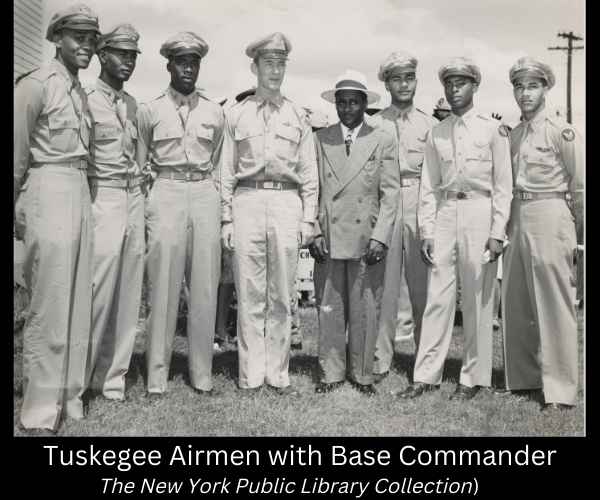
The Tuskegee Airmen were military personnel who served at the Tuskegee Army Airfield or related programs.
Nearly one thousand black pilots graduated from the Tuskegee Institute. The photograph above (from the Library of Congress) shows a class in session.
They flew single-engine fighter planes or twin-engine bombers. 352 fought in combat.
William Campbell graduated from the Tuskegee Institute in July 1942. He qualified as a fighter pilot. William was from Tuskegee, Alabama.
His combat credits said: Downed 1 Me-109 on March 31, 1945
Lindsey Campbell came from Washington, Washington D.C.. He graduated in December 1944 as a fighter pilot.
You can find a full list of graduate pilots in our list of Tuskegee Airmen.